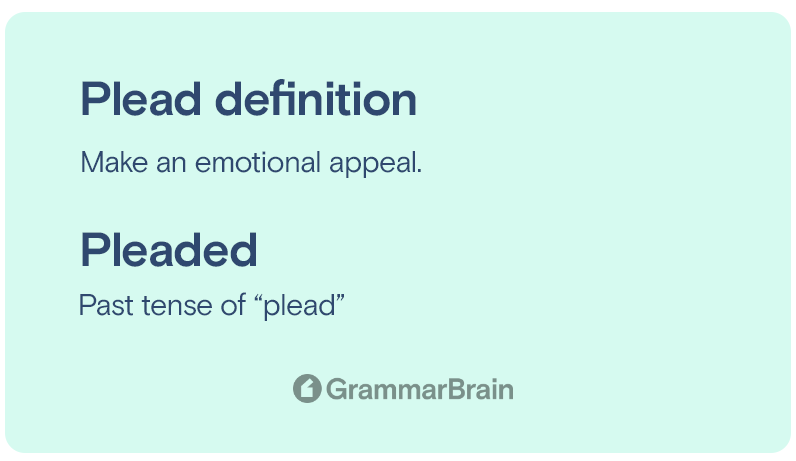The word pleaded is the past tense of the word plead. Pleaded is also the past participle version of the word plead. There is common confusion about which version of the past tense should be used in a sentence – pleaded or pled. You might have finished writing a sentence when you notice that something seems off with the grammar.
We’ll look at when to use pleaded and when to use plead. Once we know the meaning of both the words and their use, this should be much clearer.

Difference Between Pleaded, Pled, and Plea
“Pleaded” is the past tense version of the word “plead”. An alternative to the word pleaded is the word pled. Although the word pled is in use in many places, guides and dictionaries suggest using pleaded instead. It is the more accurate past tense of the word plead.
Another version of the word plead is the word plea. The word Plea means answering a claim created by a person. It is usually used in terms of a court case or any criminal proceeding.
| Word | Definition |
| Plead | make an emotional appeal. |
| Pleaded (past tense of plead) | make an emotional appeal. |
Meaning of “Plead” or “Pled”
According to Merriam-Webster, the word plead has the meaning of arguing or insisting upon or against a claim. The word is also used in association with “pleading” a case in court. The Cambridge dictionary states that the word “Plead” means making a frantic request for something. It is usually used when someone is being emotional.
The past tense of the word – pleaded, means having once made an appeal or request for something in the past.
Common synonyms of the word plead include terms like appeal, request, and beseech.
Origins
The word plead is beloved to have been used for the first time in the 13th century in the English language. The etymology of the word comes from the Middle English term – plaiden or pleden, both of which had the same meaning as plead today. It was derived from the Anglo-French words plaider, pleider, or pleder. The Anglo-French version of the word meant bringing an argument against something. This version of the word comes from the old French derivative plaid or plé.
The medieval Latin version of the word plead was known as placitare, which came from the late Latin term placitum, which meant a lawsuit. All these earlier versions of the word plead had the same meaning the word has today.
The various versions of the word that are in use now include: Pleaded, pleading, and pleadingly.
Sentence Examples
You might understand the difference between the two words better with some examples. Some common sentences with the word plead are:
“Plead for mercy from the king! The jesters cried.”
“Do you plead guilty? The judge asked”
Pleaded, as mentioned above, is the past tense of the word plead. Some common sentences that use the word are:
“She pleaded for a better sentence”
“The child cried and pleaded, but the judge did not change her mind”
“I pleaded and wept, but they wouldn’t let me out”
Conclusion
We have talked about what the word plead means and its past tense use as well. Now you can use both these words in sentences without making an error! You can try saying the sentence out loud if you feel like you need to be more sure about which version of the word to use.
Inside this article
Fact checked:
Content is rigorously reviewed by a team of qualified and experienced fact checkers. Fact checkers review articles for factual accuracy, relevance, and timeliness. Learn more.
Core lessons
Glossary
- Abstract Noun
- Accusative Case
- Anecdote
- Antonym
- Active Sentence
- Adverb
- Adjective
- Allegory
- Alliteration
- Adjective Clause
- Adjective Phrase
- Ampersand
- Anastrophe
- Adverbial Clause
- Appositive Phrase
- Clause
- Compound Adjective
- Complex Sentence
- Compound Words
- Compound Predicate
- Common Noun
- Comparative Adjective
- Comparative and Superlative
- Compound Noun
- Compound Subject
- Compound Sentence
- Copular Verb
- Collective Noun
- Colloquialism
- Conciseness
- Consonance
- Conditional
- Concrete Noun
- Conjunction
- Conjugation
- Conditional Sentence
- Comma Splice
- Correlative Conjunction
- Coordinating Conjunction
- Coordinate Adjective
- Cumulative Adjective
- Dative Case
- Determiner
- Declarative Sentence
- Declarative Statement
- Direct Object Pronoun
- Direct Object
- Diction
- Diphthong
- Dangling Modifier
- Demonstrative Pronoun
- Demonstrative Adjective
- Direct Characterization
- Definite Article
- Doublespeak
- False Dilemma Fallacy
- Future Perfect Progressive
- Future Simple
- Future Perfect Continuous
- Future Perfect
- First Conditional
- Irregular Adjective
- Irregular Verb
- Imperative Sentence
- Indefinite Article
- Intransitive Verb
- Introductory Phrase
- Indefinite Pronoun
- Indirect Characterization
- Interrogative Sentence
- Intensive Pronoun
- Inanimate Object
- Indefinite Tense
- Infinitive Phrase
- Interjection
- Intensifier
- Infinitive
- Indicative Mood
- Participle
- Parallelism
- Prepositional Phrase
- Past Simple Tense
- Past Continuous Tense
- Past Perfect Tense
- Past Progressive Tense
- Present Simple Tense
- Present Perfect Tense
- Personal Pronoun
- Personification
- Persuasive Writing
- Parallel Structure
- Phrasal Verb
- Predicate Adjective
- Predicate Nominative
- Phonetic Language
- Plural Noun
- Punctuation
- Punctuation Marks
- Preposition
- Preposition of Place
- Parts of Speech
- Possessive Adjective
- Possessive Determiner
- Possessive Case
- Possessive Noun
- Proper Adjective
- Proper Noun
- Present Participle
- Prefix
- Predicate



